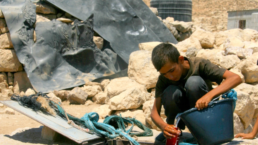The Hague can only prosecute four types of crimes. Ecocide could become the fifth.
by Lylla Younes, Grist
When reports emerged in late December that the Israeli military planned to pump seawater into the underground tunnel networks used by Hamas fighters in Gaza, scientists and advocates around the world raised alarm over the prospect of an environmental disaster. Flooding the tunnels threatened to permanently salinate the land, making it impossible to cultivate crops. Seawater could also seep underground and into an aquifer that the majority of Gazans rely on for water. Palestinian rights groups and protesters around the world were already accusing the Israeli government of committing genocide against the Palestinians, with more than 20,000 killed by Israeli bombings on Gaza since Hamas’ attack on southern Israel last October. Now, another term entered the conversation: ecocide.
Broadly defined as the severe, widespread, and long-term destruction of the environment, ecocide isn’t considered a crime under international law. At the moment, the only way to prosecute vast environmental destruction internationally is as a war crime in the International Criminal Court, or ICC, based in The Hague, Netherlands. But a growing number of countries, advocates, and legal experts are trying to change that. While some, like representatives from the island nation of Vanuatu, are motivated by the escalating climate crisis, and others, like Ukraine, are more interested in prosecuting environmental war crimes, they ultimately share the same goal: making ecocide the fifth international crime the ICC could prosecute, along with crimes against humanity, war crimes, crimes of aggression, and genocide.

Their campaign reached a major milestone in 2021, when a panel of legal experts worked over six months to create a legal definition of ecocide. Afterward, a number of countries and the European Union incorporated at least part of this definition into new legislation, which, experts said, increases the likelihood that it will eventually be adopted by the International Criminal Court. While there are plenty of obstacles to making such a law effective, advocates interviewed for this story said that the symbolic importance could have far-reaching consequences. Creating a law against ecocide could eventually force government officials and corporate executives to think twice before polluting rivers, poisoning the air, or destroying the land.
Recent Posts
“Arrest Now, Ask Questions Later”: Why Did L.A. ICE Agents Arrest and Jail U.S. Citizen Andrea Velez?
July 3, 2025
Take Action Now “They didn’t have vests that said ICE or anything. Their cars didn’t have license plates. … Just because of the color of our…
Trump’s Big, Beautiful Bill Is Naked Class War
July 3, 2025
Take Action Now Trump’s “Big, Beautiful Bill” trades tax cuts on millionaires for the dissolution of society.By Hamilton Nolan, In These Times…
Mayor Mamdani’s First Day, A Zero Hour Conversation With Richard Wolff
July 2, 2025
Take Action Now If elected, what would Mayor Mamdani do on his first day in City Hall? How would a democratic socialist govern as a big-city mayor?……
The U.S. Is Funding A Bloodbath At Gaza Aid Centers
July 2, 2025
Take Action Now The admin just gave $30M to GHF, the organization at the center of charges that Israel is weaponizing assistance and shooting at…




